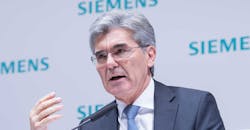Siemens CEO Urges Europe to Take Stronger Stance in Trade Battle
Siemens AG Chief Executive Officer Joe Kaeser urged the European Union to assert its voice in the trade conflict between the U.S. and China, saying the specter of a “decoupling” of political and economic systems would break with decades of integration and ultimately risk a global recession.
“Europe would be well advised to avoid this bilateral decoupling, but it can only achieve this when it is heard as a third force in the world, and that’s not the case at the moment,” Kaeser told journalists in Berlin. Part of the problem is that Germany and France, as the two biggest economies in the region, aren’t always aligned between industrial and agricultural interests, he said.
Kaeser, who recently returned from a trip to China with German Chancellor Angela Merkel, said there’s a sense that the world is reorganizing into new economic spheres, making it harder for export-oriented companies to do business and creating the risk of “having to decide between friend and foe.” The CEO said he’s concerned about the uprising in Hong Kong, a key base for Siemens with 1,800 employees and a halo effect for the entire region. At the same time, finding the right voice as a foreigner or corporate leader requires the right measure and tone, he said.
“If you choose to escalate then you need to be clear actions may follow, otherwise you’re not credible,” Kaeser said. “Only escalating without a plan is very difficult.”
There’s a good chance that Germany will drop below zero growth in coming months, Kaeser said, as the economy has already hovered close to that line recently. Any slowdown won’t be as severe as in 2008, he added.
In a global economic slowdown, countries with an export-driven market are more likely to feel a decline than those that are services-oriented, he said. The German government has certain tools at its disposal to weather a slowdown, such as shorter working hours. The country should also consider investing more in infrastructure like roads or airports, he said.
About the Author
Bloomberg
Licensed content from Bloomberg, copyright 2016.
